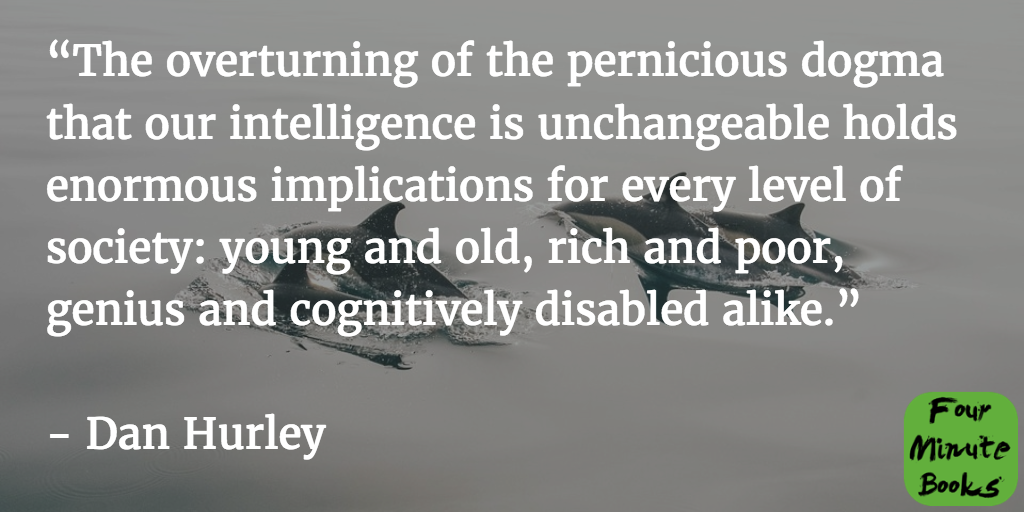1-Sentence-Summary: Smarter is one “slow learner” turned A student’s experimental account of improving his intelligence by 16% through various tests, lessons and exercises and explains how you can increase your intelligence in scientifically proven ways.
Read in: 4 minutes
Favorite quote from the author:

Audio Summary
Listen to the audio of this summary with a free reading.fm account*:
I love a good prove-them-wrong story. As a kid, Dan Hurley was told he was a slow learner, because he still couldn’t read at eight years old. At eleven, he was an A student and went on to become a successful journalist and writer for The New York Times.
Because he had a desire to understand his own transformation (and what’s possible in terms of improving intelligence) on a deeper level, he devoted a lot of his writing and time to evaluating the research in this field. He even volunteered himself as a guinea pig for the latest methods.
All of his findings have been compiled in Smarter, so you can get the most of the newest research, learn what truly makes a person intelligent and become smarter.
Here are 3 lessons to increase your brainpower:
- There are two kinds of intelligence, and both can be increased.
- You can use computer games to boost your working memory.
- Far transfer allows you to use your knowledge about one task with another.
Ready to raise your knowledge rank? Let’s play some mental games!
Lesson 1: Intelligence is part fluid, part crystallized, and both can be increased.
Intelligence was divided into two parts as early as the 1970s. Back then, scientists discerned them as follows:
- Fluid intelligence.
- Crystallized intelligence.
Fluid intelligence is your capacity for logic thinking and reasoning. When you’re presented with a new problem you haven’t seen before, and then try to analyze it by spotting patterns, thinking about principles and building your own reasoning around how to overcome it, that’s fluid intelligence at work.
This is the part of your intelligence that scientists believed to be fixed until a few years ago.
Crystallized intelligence is the knowledge base you build up over time, including facts, the memory of how to perform certain tasks or actions (like riding a bike) and knowing how to read. This kind of knowledge constantly grows.
Fluid intelligence reaches its peak during young adulthood (which is why great mathematicians often have their biggest breakthroughs early in their lives) and is also closely correlated with the physical size of your brain, which is why scientists long thought it’s impossible to change – but as it turns out, that’s not true.
Lesson 2: You can play certain computer games to increase your working memory.
In 2008, Susanne Jaeggi conducted a study including computer games of the so-called N-back type. These games usually show you different elements, one after the other, and then ask you questions for which you have to remember the element that you saw “N back”, where N can be any number.
For example, if I give you an iPad and show you an A on its screen, followed by a B and then a C, and I ask you to tell me what the first letter was (A), this’d be a 2-back game, because you’ll have to remember the letter that came two positions before the C.
After four weeks of playing these kinds of games, the participants of the study showed a 40% increase in fluid intelligence tasks.
This was the first time a study in a scientific context had proven that fluid intelligence can actually be improved with practice. That’s great news for you and me, and for the 70 million people who already play these kinds of games created by companies like Lumosity.
Also, games similar to these could even help people with illnesses like ADHD.
Lesson 3: Transferring your new knowledge from one task to the other is called far transfer.
Do you know what a meta-study is? It’s a study of studies. For training working memory, like in the study above, a meta study was conducted in 2013, which brought up the following issue: while effective in the short term, most of the results from training working memory could only be transferred to other, unrelated tasks, in a few cases, and wore off quickly.
To analyze the efficiency of the training, the authors looked at 23 other studies and their results. The ray of hope in this is that they did acknowledge the positive results for similar tasks in the short term – for example, if you play N-back games using words for four weeks, you’ll be better at other N-back tasks (with non-verbal components) right after completing your training.
This transfer of learning from one context to another, which isn’t directly related to it, is called far transfer and is very desirable, because it makes your learning more effective. Science will still have to figure that one out, but with the military alone pouring millions of dollars into this kind of research, we’re likely to see even better games and ways of mental training in the future.
Smarter Review
I expected a bunch of hacks and stories about individual’s productivity, and thought Smarter, if really good, would be similar to Smarter Faster Better, but it actually took a lot of time investigating the status quo and explaining the history of research in learning. I like that.
Dan Hurley is very dedicated and not afraid to take a few hits himself to move this branch of science forward. That’s admirable and it’s something that flows through the entire book, which makes it a read well worth your time.
Who would I recommend the Smarter summary to?
The 17 year old video game nerd, the 39 year old mathematician, who thinks her best days might be over, and anyone who wants to catch up on the science of learning.
Last Updated on August 1, 2022